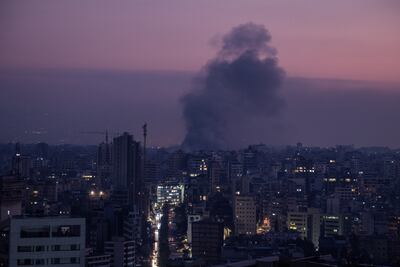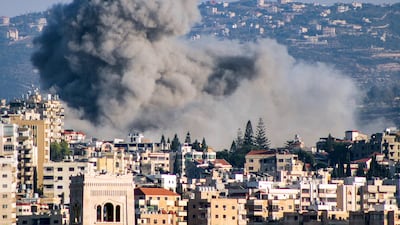Each morning, I wake up to a world thick with poison. The air in Lebanon grows heavier, each breath a struggle as the death that hangs around us tightens its grip. Many people are falling ill, suffocating from this noxious haze that seems to settle deeper into our lives with each passing day. The night sky is shattered by explosions. As the sounds of bombardment fade, what’s left behind is a choking, white haze that hovers in the air.
Every inhalation feels like a gamble with fate, the invisible danger lurking in each molecule. I stare at the smoke, billowing without end, feeling an unshakable dread as I wonder how much worse this nightmare will get.
Our firefighters – who might offer a glimmer of relief – are powerless to act. Israeli drones patrol the skies above, keeping them at a distance and leaving the flames to burn unabated. This toxic fog doesn’t just float over the city; it permeates every space, every breath, creeping silently into our bodies and our futures. It’s a catastrophe unfolding in slow motion, one that demands a response. How can the world stand by and watch in silence? How can humanity ignore this relentless destruction?

Here we are, watching helplessly as war overshadows every diplomatic effort, every hope we had that reason and humanity would win out over violence. We believed in the values we set together – a commitment to leave no one behind and to create a world built on peace and sustainability. Now, each explosion feels like it’s tearing apart not just the land but also the progress we've built together over the years, undermining the very goals we’ve strived for, side by side, to make a better future for everyone.
I get calls and messages every day. As an atmospheric expert, people reach out, frightened and desperate, with questions about every new symptom, every cough, each struggle to breathe, wondering if it’s all tied to the war. One asks if the sudden chill in the air or the dryness might be connected to the plumes of smoke that cloak the sky each night. Others ask if the strange static charges that have intensified in recent days are somehow linked to the war.
On a local scale, these air strikes and bombings undoubtedly affect our micro-environment. The fires burn hot, thick black smoke rises, and the white fumes linger for hours, wrapping us in a toxic mist. Explosions can impact the surrounding air, releasing dust, smoke and debris that may affect air quality, visibility, and even briefly create “heat islands”, with slight changes in temperature or wind patterns. But these shifts are temporary, vanishing as the fires die down.
For those experiencing autumn’s chill, the dryness, and the charged air, I explain that these are typical seasonal changes. The colder temperatures, dryness and electrostatic charges stem from occasional air masses moving from the north-east, blowing in from over the Damascus Desert (Badiyat Al Sham).
It is a science that explains our physical sensations, grounding us in what’s familiar about our environment. But science has no words for the devastation we’re enduring. No explanation can truly capture the reality of what Gazans and Lebanese are living through – an ordeal beyond any rational understanding.
Each day, the poisons do more than pollute the air; they seep deep into our soil and water, infiltrating every aspect of our environment. The ground is now saturated with toxic contaminants, and entire swathes of agricultural fields and forests are reduced to ash. Once-vibrant lands that provided food, shelter and a sense of stability for our communities have been charred beyond recognition, their rich, life-giving soil turned into wastelands.
But the devastation doesn’t end at the surface. Every drop of rain that falls carries invisible remnants of this destruction, embedding harmful particles into the earth and seeping down into the underground water reserves we depend on. These hidden lifelines, meant to sustain us, are being slowly poisoned, transforming the environment itself into a weapon against us.
The war extends beyond physical harm – it taints the resources that nurture and sustain life, spreading a nightmare that grows with each passing day, threatening not only our present but the future of our children and generations yet to come.
This unending contamination reflects the incomprehensible choice of violence over diplomacy, of mass destruction over peace. The impact of violence on human lives and the environment is profound, as poison infiltrates our air, soil, and water, permeating the very foundation of our existence.
The global commitment to climate action is overshadowed by the chaos of war, as Lebanon’s people and its environment are ravaged. While Hezbollah fighters may have initiated this conflict without the consent of the Lebanese people, Israel’s response – marked by relentless massacres and widespread destruction – has ignited and continues to escalate this brutal war, with the international community watching, offering little meaningful pressure to halt this cycle of violence.
Even if left behind, we will document and write our own history, capturing both the depths of our struggles and the heights of our recovery. We will share our journey with the world, coming out stronger from each hardship. With unwavering hope and courage, we will help build a more resilient world, standing firm in our commitment to a future where the right to live in peace and dignity is universal. Until that day, we remain steadfast, united in our pursuit of a brighter future, and determined to turn today’s adversity into a foundation for a better tomorrow for all.
Najat A Saliba is a professor of chemistry at American University Beirut, an environmental conservationist and a member of the Lebanese Parliament
Rashad Rafeh is executive director of the Socio Economic Institute for Development (SEID), a Lebanese non-profit organisation
Live updates: Follow the latest on Israel-Gaza

